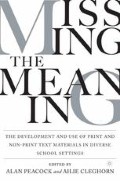Abstract
The paradox relating to the use of nonfiction text materials in primary schools is that on the one hand they are seen as central to the process of teaching and learning, whilst on the other hand there is little evidence of their effective use by learners themselves. This is true not only in second-language and developing country contexts but also in countries such as the United States and United Kingdom where publication and use of such text material in primary schools has been fostered for several decades, and where a wide range of material is available. In the United States, for example, Shulman (1987) concluded that most teaching is initiated by some form of text; yet Ball and Feiman-Nemser (1988) demonstrated that teachers in training were discouraged from using the set texts, and instead were encouraged to develop their own materials. In U.K. teacher education institutions, most trainees are not taught or encouraged to use existing text material in science (Peacock & Gates, 2000); instead we stress the importance of differentiation and therefore as in the United States, we encourage trainees to develop and use materials (often worksheets) of their own construction.
Access this chapter
Tax calculation will be finalised at checkout
Purchases are for personal use only
Preview
Unable to display preview. Download preview PDF.
References
Ball, D.L. & Feiman-Nemser, S. (1988). Using textbooks and teachers’ guides: a dilemma for beginning teachers and teacher educators. Curriculum Inquiry, 18 (4), 401–423.
Biber, D. (1991). Oral and literate characteristics of selected primary schools texts. Text, 11, 12–25.
Cleghorn, A. (1992). Primary level science in Kenya: Constructing meaning through English and indigenous languages. Qualitative Studies in Education, 5 (4), 311–323.
Cleghorn, A. & Rollnick, M. (2002). The role of English in individual and societal development: A view from African classrooms. TESOL Quarterly, 36 (3), 347–372.
Cummins, J. (1983). Language proficiency and academic achievement, in J.W. Oller (Ed.), Issues in language testing research. Rowley, MA: Newbury House.
Dowling, P. (1995). A sociological analysis of school texts. Proceedings of the Annual Conference of the Southern African Association for Research in Mathematics and Science Education, Cape Town.
Francis, V. (1996). Personal communication, December 20.
Gilbert, S. W. (1989). An evaluation of the use of analogy, simile and metaphor in science texts. Journal of Research in Science Teaching, 30 (2), 187–207.
Hyltenstam, K. & Stroud, C. (1993). Final Report and Recommendations from the Evaluation of Teaching Materials for Lower Primary in Mozambique: (II) Language Issues. Stockholm: Stockholm Institute of Education.
Koulaidis, V. & Tsatsaroni, A. (1996). A pedagogical analysis of Science textbooks: How we can proceed? Research in Science Education, 26 (1).
Langhan, D. (1993). The Textbook as a Source of Difficulty in Teaching and Learning: Final Report of the Threshold 2 Project. Pretoria: Human Sciences Research Council.
Macdonald, C.A. (1990a). School-based learning experiences: A final report of the Threshold Project. Pretoria: Human Sciences research Council.
Macdonald, C.A. (1990b). Standard 3 General Science Research 1987–88: A Final Report of the Threshold Project. Pretoria: Human Sciences Research Council.
Murila, B. (2002). An investigation into the use of science textbooks in selected primary schools in Kenya Unpublished Masters thesis. University of Exeter, UK.
Nuffield Primary Science. (1993). Teachers’guides. London: Nuffield Foundation/Coffins Educational.
Nuffield Foundation. (1998). Science and literacy: A guide for primary teachers. London: Nuffield Foundation/Collins Educational.
Peacock, A. (1995a). Access to science learning for children in rural Africa. International Journal of Science Education, 17 (2), 149–166.
Peacock, A. (1995b). An agenda for research on text material in primary science for second language learners of English in developing countries. Journal of Multilingual and Multicultural Development, 16 (5), 389–401.
Peacock, A. (2001). The potential impact of the Literacy Hour on the teaching of science from text material. Journal of Curriculum Studies, 33 (1), 25–42.
Peacock, A. & Gates, S.M.G. (2000). Newly-qualified teachers’ perceptions of the role of text material in teaching science. Paper presented at the Comparative and International Education Society Annual Conference, Toronto, April 1999.
Peacock, A. & Perold, H. (1995). Helping primary teachers develop new approaches to science teaching: A strategy for the evaluation of ‘Spider’s Place.’ Proceedings of Annual Meeting of the Southern African Association for Research in Mathematics and Science (SAARMSE), Cape Town, January 1995.
Peacock, A. & Weedon, H. (2002). Children working with text in science: disparities with ‘Literacy Hour’ practice. Research in Science and Technology Education, 20 (2), 185–197.
Perold, H. & Bahr, M.A. (1993). National science education project dealing with primary science: Report on the evaluation of the materials comprising the pilot programme. Johannesburg: Handspring Trust.
Rollnick, M.S. & Rutherford, M. (1990). African primary school teachers what ideas do they hold on air and air pressure? International Journal of Science Education, 12 (1).
Roth, K.J. (1985). Conceptual change learning and student processing of science texts. Michigan: Michigan State University Institute for Research on Teaching.
Shulman, J. (1987). Knowledge and teaching; foundations of the new reform. Harvard Educational Review, 57 (1), 1–22.
Sweller, J. (1994). Cognitive Load theory, learning difficulty and instructional design. Learning and Instruction, 4, 295–312.
Vachon, M.K & Haney, R.E. (1991). A procedure for determining the level of abstraction of Science reading material. Journal of Research in Science Teaching, 28 (4), 343–352.
van Rooyen, H. (1990). The disparity between English as a subject and English as the medium of learning: A final report of the Threshold Project. Pretoria: Human Sciences Research Council.
Walpole, S. (1999). Changing texts, changing thinking: Comprehension demands of new science textbooks. The Reading Teacher, 52 (4), 358–369.
Wray, D. & Lewis, M. (1995). Extending interactions with non-fiction texts: An exit into understanding. Reading, 29 (1), 20–35.
Editor information
Editors and Affiliations
Copyright information
© 2004 Alan Peacock and Ailie Cleghorn
About this chapter
Cite this chapter
Peacock, A., Cleghorn, A. (2004). Introduction. In: Peacock, A., Cleghorn, A. (eds) Missing the Meaning. Palgrave Macmillan, New York. https://doi.org/10.1057/9781403982285_6
Download citation
DOI: https://doi.org/10.1057/9781403982285_6
Publisher Name: Palgrave Macmillan, New York
Print ISBN: 978-1-4039-6091-7
Online ISBN: 978-1-4039-8228-5
eBook Packages: Palgrave Social & Cultural Studies CollectionSocial Sciences (R0)

